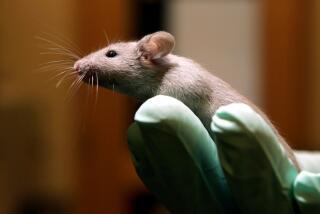Lab-grown mouse sperm could spawn fertility treatments for men
- Share via
Scientists have grown sperm cells in a dish from the testicular tissue of mice, the journal Nature reported Wednesday.
The team, led by Takuya Sato of the Yokohama City University Graduate School of Medicine in Yokohama, Japan, grew healthy sperm in the laboratory and used them to produce fertile offspring, according to the study.
The discovery is a nifty technical feat. For decades, scientists had tried without success to maintain spermatogenesis (the multistage process by which spermatogonial stem cells grow to become sperm) in mammals in a lab setting.
But more important, wrote Dr. Marco Seandel and Dr. Shahin Rafii in a related Nature commentary, the breakthrough may one day help doctors design fertility treatments for men.
One group of patients to target? Young boys undergoing treatment for cancer.
A possible side effect of chemotherapy or radiation therapy for cancer is destruction of the cells that create sperm, rendering the patients infertile.
Adults about to receive cancer treatment can bank sperm before their treatment, but that isn’t an option for boys who have yet to reach puberty.
Perviously, Seandel and Rafii wrote, researchers proposed preserving fertility in such patients by freezing their spermatogonial stem cells for later transplant, but that approach has not yet been tested in humans.
Sato’s work suggests that freezing testicular tissue instead, and growing the sperm in the lab later for in vitro fertilization, could be another option. The commentary authors wrote that further work on the technique’s safety would be needed before it would be ready for clinical use.
More to Read
Sign up for The Wild
We’ll help you find the best places to hike, bike and run, as well as the perfect silent spots for meditation and yoga.
You may occasionally receive promotional content from the Los Angeles Times.











